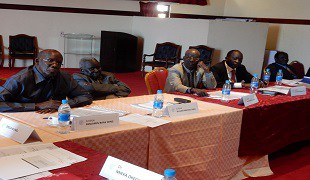Foundation concludes its assistance in the drafting of Rules of Procedure for the Constitutional Panel of the Supreme Court of South Sudan
On 27 and 28 May 2016, the Max Planck Foundation, in close cooperation with the Supreme Court of South Sudan, conducted a drafting workshop in Juba for the Supreme Court on the Rules of Procedure for its Constitutional Panel, in fulfilment of its mandate under Article 126(3) and (6) of the Transitional Constitution of South Sudan, 2011.
In the course of the workshop, Research Fellows from the Max Planck Foundation team advanced on progress made in the December 2015 and February 2016 workshops, entitled “Rules of Procedure” and “Rules of Procedure (II)” respectively, as well as close consultations with the Justices of the Supreme Court in the weeks prior to the workshop. The Research Fellows presented on procedural issues that had remained unaddressed or contentious during the first two workshops. Crucial matters were illuminated in comparative African and European perspective, drawing on experiences from other apex courts. The Research Fellows also facilitated the dialogue on possible solutions for the Constitutional Panel. The Foundation’s approach to provide comparative legal material as well as to offer an interactive forum resulted in agreement on numerous draft provisions for the Rules of Procedure.
The workshop was inaugurated by the Chief Justice of the Supreme Court of South Sudan, Justice Chan Reec Madut, and a representative of the Max Planck Foundation. It was the final in a series of three workshops on the topic of “Rules of Procedure” with the Justices of the Supreme Court and marked the conclusion of the drafting process for the Rules of Procedure of the Constitutional Panel of the Supreme Court of South Sudan.
This workshop comes under the second of two components of the project “Technical Support to the Supreme Court of South Sudan”, which is funded by the German Foreign Office and implemented by the Max Planck Foundation. The project began in 2014, and with this successful implementation of all foreseen activities, it will formally expire in June 2016.

